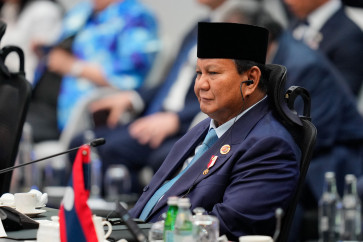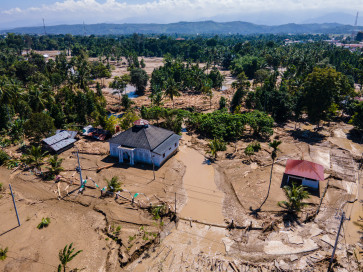Popular Reads
Top Results
Can't find what you're looking for?
View all search resultsPopular Reads
Top Results
Can't find what you're looking for?
View all search results`Jakarta Shimbun' a bridge to Indonesia
Founded by veteran journalist Yasuo Kusano on Nov
Change text size
Gift Premium Articles
to Anyone
F
ounded by veteran journalist Yasuo Kusano on Nov. 6, 1998, The Daily Jakarta Shimbun is the only Japanese-language newspaper published in Indonesia.
At eight pages daily and a four-page lifestyle supplement on Fridays, the paper may be short in length but it is broad in its mission: "Drawing upon an understanding of Indonesia's history and culture, to provide accurate news and long-term insights on Indonesia to Japan and the international community, and to offer useful information to Japanese expatriates and businesses in the country."
Starting with a circulation of a mere 50 copies, The Jakarta Shimbun now distributes about 4,000 copies among the approximately 11,400 Japanese living across the country. It also distributes discounted copies to Indonesians studying Japanese at universities and language centers, and works with Garuda Indonesia to provide in-flight copies on routes popular among Japanese tourists.
Editor-in-Chief Kusano recently spoke to contributor Chisato Hara on the paper's creation and development by email from Tokyo, where he is currently undergoing medical treatment. Following is an excerpt from this correspondence.
Question: How and when did you first come to Indonesia, and what made you decide to stay?
Answer: I (first) visited Jakarta in 1980 as a special correspondent with the (Japanese daily) Mainichi Shimbun. From 1981 through 1986, I was here as Mainichi Shimbun's Jakarta Bureau Chief. ...Although the Suharto regime was an authoritative government, Indonesia then was still a slow-paced, agricultural village society that I found to be spiritually recuperative.
In being exposed to Indonesia's diversity and the warmth of its people, corresponding with Indonesian journalists and intellectuals who were battling the suppression of free speech, and getting to know businessmen and officials who were making efforts to develop the country's economy, I was motivated to continue to provide coverage on Indonesia for the foreseeable future. I'll never forget how impressed I was when The Jakarta Post was published in 1983 as the third English-language newspaper.
All in all, I've been here 18 years.
How did the events of 1998 lead to your decision to create The Jakarta Shimbun?
To somehow create "a newspaper that delivers accurate information on Asia to Japan" was a plan I arrived at through my decades-long journalistic experience.
At the end of May 1998, after Suharto had resigned, I came back to Jakarta from Tokyo. Following the "Jakarta riots", the capital was silent and deserted, and Kota was blackened by all the arson. Martial law was evident. Garuda's Bali flight out of Narita was completely empty.
In Jakarta, I reunited with fellow Indonesian journalists as well as Japanese businessmen I'd known previously, and realized that Indonesia - coming from its Independence War and through the Cold War era - had finally entered an era of democratization.
In support of the "Indonesia Baru" (New Indonesia) democratization movement, I felt there was a need to provide Japan with accurate news on Indonesian politics and culture, as well as to provide Japanese expatriates in Jakarta and Bali with news - not hearsay - and provide long-term analyses based on an appreciation of its history and culture.
... I was deeply moved while covering the revival of publications that had been banned under the Suharto regime, such as Tempo magazine and the Jurnal Ekuin business magazine, as they continued their struggle, embracing the new freedom of speech and press.
I also desired to follow in the footsteps of Indonesia's senior journalists who had fought for democracy since Independence, and to learn from them. This was another factor that motivated me to publish a Japanese-language newspaper (here).
The 1998 crises caused a decline in the Japanese expatriate population. How did this affect the founding of The Jakarta Shimbun?
The Jakarta riots and the political instability that followed caused the Japanese population to drop to less than half the previous number. However, this actually created an opportunity to publish the paper. In the midst of rising socio-political instability, I believed it was even more urgent to provide Japanese families and businesses with news on the government and economy that was as accurate as possible - not rumor or mere observation - and further, news that took a longer-term view and did not take a negative stance.
...While funding (the paper) was difficult, a great number of Japanese expatriates welcomed The Jakarta Shimbun upon its trial run in September 1998. In addition, then information minister Yunus Yosfiah and former education minister Wardiman Djojonegoro - who remains an advisor to the paper today - both encouraged our staff "to create a good newspaper that acts as a bridge between Indonesia and Japan".
What was the paper's original focus, and how has this expanded over the past 10 years?
In the beginning, the paper concentrated on the rocky period of the Habibie and (Abdurrahman) Wahid governments and the transitionary period of the democratization era, but following the Asian monetary crisis and the era of economic reform under the Megawati government, (we) began to shift our focus to Japanese business and investment activities -- in particular coverage on SME investment, industry, skills transfers and CSRs. In addition, the paper provides in-depth coverage of the embassy, the Jakarta Japan Club and their activities.
What other coverage do you offer aside from those provided by the paper's reporters?
These past few years has seen an increase in Internet use by both Indonesians and Japanese, resulting in easy access to news on Japan and a rising interest in such news among our Japanese and Indonesian readers.
In response, aside from news on Japan through the Kyodo wire service and national news through Antara news agency, the paper releases contributions from scholars specializing in Asia, Indonesian researchers and repatriated nationals in Japan; for example on the activities of Indonesian nurses and caregivers and other Indonesian nationals working in Japan.
What sections have been created especially for the local Japanese community?
From the inaugural issue, the paper has cooperated with the Jakarta Japanese School to publish student essays, as its students, parents and teachers engage in many educational and cultural activities and are thus a valuable source of community news.
Besides this, the paper has a "Life" page covering Japanese supermarkets and restaurants, cooking, health and safety tips for living in Indonesia, as well as a column by a parenting expert featuring stories like "Early Childhood Education & Living Overseas" and "Infant Health". We've also expanded to include other sections that address the Japanese community's interests, such as the "Flamboyant" column featuring essays by housewives.
What is the biggest editorial challenge in publishing the paper?
From my experience as a special correspondent to Asia and New York, and in comparison with some of the major cities in Japan today, I do not think that the socio-political situation in Indonesia is particularly bad. Still, following 9/11, I have been careful in covering and in disseminating information on terrorist attacks ... which have counted Japanese nationals among its victims, so that such coverage do not stoop to mere sensationalism - because such news has a great impact on Japanese tourists and investors.
The same (caution) applies to coverage on bird flu and other possible pandemics, the earthquakes in Aceh and Central Java, as well as the tsunami disaster.
What do you think is the central issue in Japanese-Indonesia cross-cultural relations?










